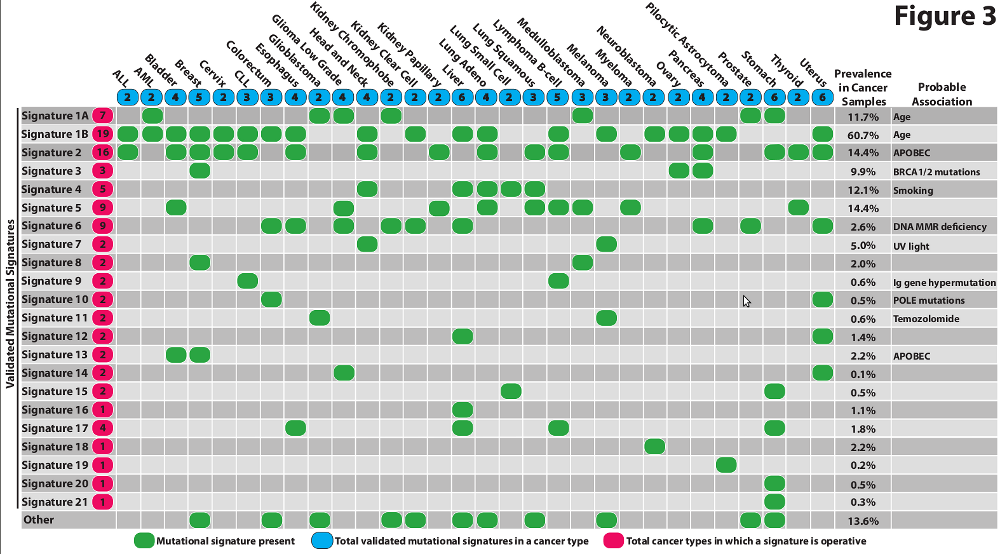Cancer's origins revealed
Researchers have provided the first comprehensive compendium of mutational processes that drive tumour development. Together, these mutational processes explain most mutations found in 30 of the most common cancer types. This new understanding of cancer development could help to treat and prevent a wide-range of cancers.
Each mutational process leaves a particular pattern of mutations, an imprint or signature, in the genomes of cancers it has caused. By studying 7,042 genomes of people with the most common forms of cancer, the team uncovered more than 20 signatures of processes that mutate DNA. For many of the signatures, they also identified the underlying biological process responsible.
All cancers are caused by mutations in DNA occurring in cells of the body during a person’s lifetime. Although we know that chemicals in tobacco smoke cause mutations in lung cells that lead to lung cancers and ultraviolet light causes mutations in skin cells that lead to skin cancers, we have remarkably little understanding of the biological processes that cause the mutations which are responsible for the development of most cancers.
“We have identified the majority of the mutational signatures that explain the genetic development and history of cancers in patients. We are now beginning to understand the complicated biological processes that occur over time and leave these residual mutational signatures on cancer genomes.”
Ludmil Alexandrov first author from the Wellcome Trust Sanger Institute

All of the cancers contained two or more signatures Reflecting the variety of processes that work together during the development of cancer. However, different cancers have different numbers of mutational processes. For example, two mutational processes underlie the development of ovarian cancer, while six mutational processes underlie the development of liver cancer.
Some of the mutational signatures are found in multiple cancer types, while others are confined to a single cancer type. Out of the 30 cancer types, 25 had signatures arising from age-related mutational processes. Another signature, caused by defects in repairing DNA due to mutations in the breast cancer susceptibility genes BRCA1 and 2, was found in breast, ovarian and pancreatic cancers.
“Through detailed analysis, we can start to use the overwhelming amounts of information buried deep in the DNA of cancers to our advantage in terms of understanding how and why cancers arise. Our map of the events that cause the majority of cancers in humans is an important step to discovering the processes that drive cancer formation.”
Dr Serena Nik-Zainal, author from the Wellcome Trust Sanger Institute
The team found that a family of enzymes, which is known to ‘edit’ (ie mutate) DNA, was linked to more than half of the cancer types. These enzymes, known as APOBECs, can be activated in response to viral infections. It may be that the resulting signatures are collateral damage on the human genome caused by the enzymes’ actions to protect cells from viruses.
Recently, the research team described a remarkable pattern of mutation in breast cancer whereby small regions of the genome are deluged with mutations. They now show that this process, known as kataegis, is present in most cancers. Researchers speculate that the onset of kataegis may also be linked to the activation of APOBEC enzymes.
“We have uncovered the archaeological traces within cancer genomes of the diverse mutational processes that lead to the development of most cancers. This compendium of mutational signatures and the consequent insights into the mutational processes underlying them has profound implications for the understanding of cancer development with potential applications in disease prevention and treatment.”
Professor Sir Mike Stratton Lead author and Director of the Wellcome Trust Sanger Institute
More information
Funding
A full list of funding can be found on the paper.
Participating Centres
A full list of participating centres can be found on the paper.
Publications:
Selected websites
The Wellcome Trust Sanger Institute
The Wellcome Trust Sanger Institute is one of the world’s leading genome centres. Through its ability to conduct research at scale, it is able to engage in bold and long-term exploratory projects that are designed to influence and empower medical science globally. Institute research findings, generated through its own research programmes and through its leading role in international consortia, are being used to develop new diagnostics and treatments for human disease.
The Wellcome Trust
The Wellcome Trust is a global charitable foundation dedicated to achieving extraordinary improvements in human and animal health. We support the brightest minds in biomedical research and the medical humanities. Our breadth of support includes public engagement, education and the application of research to improve health. We are independent of both political and commercial interests.


